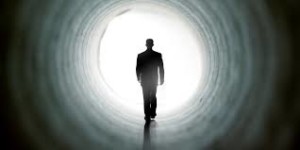
Matthew and Nancy Botsford
Why are atheists so adamantly opposed to the idea that consciousness could possibly survive physical death of the human brain?
For several years now, I’ve conducted personal research mostly to satisfy my own curiosity about what might happen when we die. I’ve read dozens, if not hundreds of articles describing various scientific studies of the near death experience to learn what doctors and scientists think they have discovered about this phenomena.
I’ve personally interviewed people making NDE claims. I seen enough and read enough to believe that the mind and brain separate at death. The spiritual mind survives; the physical brain does not.
Dr. Bruce Greyson established what is now called the Greyson NDE scale of 16 specific attributes many alleged NDE claims share in common. These attributes include seeing a bright light at the end of a tunnel, reuniting with dead relatives, the sensation of leaving their physical body, etc.
 My atheist friends have vehemently argued that these events are hallucinogenic in nature, originating from chemicals produced by the dying brain to make the transition to death more pleasant and less traumatic. However, the typical atheist’s arguments are fatally flawed, for two reasons.
My atheist friends have vehemently argued that these events are hallucinogenic in nature, originating from chemicals produced by the dying brain to make the transition to death more pleasant and less traumatic. However, the typical atheist’s arguments are fatally flawed, for two reasons.
First of all, not every NDE is a pleasant or euphoric experience. Some are quite terrifying. After learning about his experience from the television program I Survived: Beyond and Back, the reason I sought to interview Matthew Botsford in particular was because he was by every account an innocent bystander accidentally gunned down in a drive-by shooting — yet he emphatically insisted that his NDE experience took place in hell.
The second reason the atheist’s criticisms don’t hold water is called a corroborated veridical NDE event — specifically, the person experiencing near death in location “A” claims to learn new information found in physical location “B” and that claim later can be verified independently.
For example, Michaela Roser has claimed while undergoing emergency surgery that saved her life, her consciousness visited the hospital cafeteria. There “she” claimed to witness a very unusual conversation that involved smoking, her parents, and her two grandmothers. Her family confirmed the conversation had taken place when Michaela emerged from a coma, several weeks later.
Scientific studies have clearly established that people who claimed to have an NDE have a change in attitude toward death — a large majority of survivors claim they no longer fear death. They claim to enjoy life more. They often volunteer to serve in hospice care, helping make the transition easier for those facing imminent death.
My question for my atheist friends is not why they reject the idea of life after death — that seems rather obvious. The question is, why would they want to destroy the peace and tranquility of these NDE survivors who believe their experience was real?
Even if the experience could be proved to have been false, the survivor received a tangible benefit as a result in most cases. Why would anyone want to try to take that feeling of bliss away from them?
The really sad thing is that the experiences appear to be real and true, so critics must misrepresent the evidence in order to make it appear weaker than it really is.
If only one example of corroborated veridical NDE evidence can be proved true, then strict materialism is dead, And there are thousands, if not millions of stories like Michaela’s and Matthew’s.
The rejection of the substantial and growing body of corroborated veridical NDE evidence seems to require my atheist friends to become conspiracy theorists beyond all reason and compare.
After all, rejecting all of the evidence requires the atheist believe that the victim, family, friends, doctors, and every other witness must have colluded to deliberately perpetuate a lie.
That absurd assumption begs this question be asked: cui bono? Who benefits from the alleged lie?

Speak Your Mind